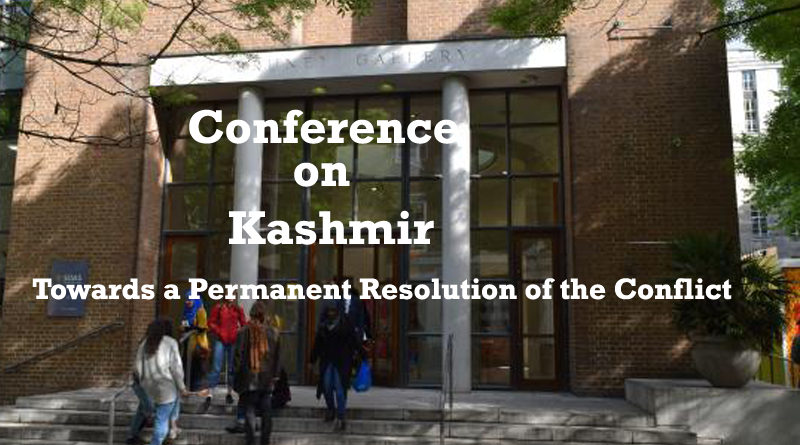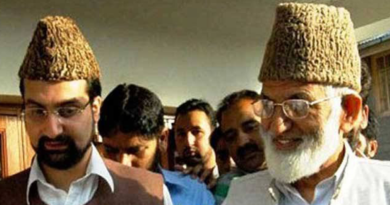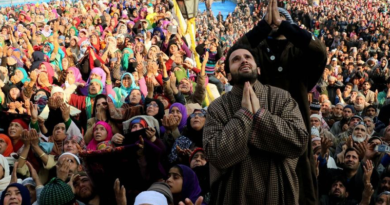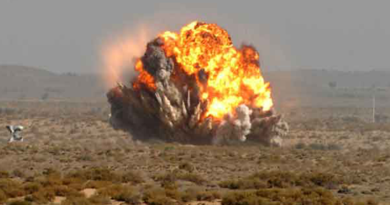One Day Conference On Kashmir: Towards a Permanent Resolution
Coinciding with the 63rd death anniversary of the great poet-visionary Allamah Iqbal, Mahazi-Islami (occupied Kashmir) in collaboration with Al-Ansar (U.K.) is organising a one day conference on 21stApril, 2001 on the theme mentioned above in Brunei Hall of the School of Oriental and African Studies, University of London, London, U.K. Prominent political personalities and academic luminaries are expected to attend. The purpose of the conference is to highlight the need of a permanent resolution as opposed to ad-hoc solution of the Kashmir problem, so that peace is achieved on the basis of an equitable solution and not at the cost of it. This would require shunning dishonest scholarship that addresses facts only to hide the underlying truth, rising above the narrow considerations of political expediency, and exclusive partisan interests, and squarely addressing the real causes and sources of the conflict. This is what the conference will do. In the following lines we will very briefly explain the idea behind the conference, and Allamah’s relevance to it.
Kashmir problem, in a fundamental way, symbolises the post-British political mess in south Asia. We need to understand the factors, reasons and circumstances, which brought about this mess. Quite often we hear that it is the British who created Kashmir problem. This is only a very partial view; a fuller understanding is needed. If it was only the British, the problem would have come into being but it could have not endured for all these past 53 years, when the British are no longer at the scene. Local factors and circumstances have to be taken note of, chief among them being the emergence and empowerment of a hitherto unknown species the ‘neo-Hindus’ (as some historians call the early western educated Brahmins) soon after the arrival of the British in the Indian sub-continent, and the subsequent genesis of Hindu/Indian nationalism. This nationalism, one can safely assert, holds the key for answers to all our vital questions:
a) Why has South Asian sub-continent progressed so little after its independence?
b) Why this region has witnessed wars (Indo-Pak), blood shed, and permanent political tension? And above all
c) Why after all is the Kashmir problem so far unresolved?
We can find answers, but only when we understand a basic truth about Hindu/Indian nationalism, namely, in India “nationalism as political movement, national identity, and nationalist ideology”, as Professor Achin Vanaik, in his book ‘,The Painful Transition: Bourgeois Democracy in India’ (London: Verso.1990), writes, “did not develop in the wake of religious decline. A Hindu religious ‘renaissance’ was central to the emergence of all three”. This is contrary to what happened in the cradle of nationalism, Europe: here the dawn of nationalism followed the dusk of religious modes of thought. In the course of a thorough process of secularization, when the religious authority declined, not only at the political level, but at the social and family levels as well, the Nation-state emerged as an independent secular centre of loyalty for the people. In India, things moved differently. Here a religious-civilizational tradition (also referred to as neo-Hindu tradition), to act as an ideology binding different communities with segmental identities, into a single ‘Hindu’ community(which was hitherto non-existent), was constructed first, and in this, as Professor Romilla Thapar argues( see Achin Vanaik’s book cited above), Brahmanical beliefs and rituals came to constitute the core of the tradition; from this tradition derived the Indian Nationalist ideology, which because of its source of inspiration, sought to recreate a future in the image of a ‘golden Hindu past’(in Gandhi’s words ‘Golden age of Ramarajya’) that had existed in ancient times, but was allegedly disrupted by Muslims.
So Indian/Hindu nationalism should not be treated as simply a variety of nationalism in general, a direct offshoot of westernization in India under British rule. The truth is that West’s influence could hardly make any real impact on India’s social reality. For example the age old caste system remained as it was. For that matter, same was almost the case with Islam earlier: it hardly could bring any big changes there, despite the fact that Islam brings profound transformations in the lives of individuals and nations. Why is it so in India, might be worth investigation, but it is not directly a subject of our concern here, what is relevant here, is that instead of treating it yet another variety of nationalism, Indian/Hindu nationalism should be treated as an empire-building enterprise, that too ferrocious, because of being permeated by Hindu religious sentiment. This nationalist ideology inaugurated a new dark chapter of Imperialism in south Asia, as it (both, the expressly Hindu and the secular versions of it) sought to impose homogeneity on an otherwise heterogeneous, multicultural, multilingual sub-continent. This imperial mind-set refused to recognize the right of religious/cultural communities to independently think of and plan their political future. It is precisely here that one should appreciate Allamah Iqbal’s contribution to the recent sub-continental political history. Allamah was not a politician in the usual sense of the term; he was primarily a visionary. He could see things in a long-term perspective. A believer in human dignity and freedom, Allamah, apart from, emphasizing the fact of Muslims in India being a ‘distinct political entity’—–they being essentially a part of the global Islamic Ummah and not the individuals of the so-called territorial Indian nation—–also very strongly advocated that all the other non-Muslim communities and groups as well, had a right to free development in accordance with their own respective cultural traditions. In advocating unitary forms of government, Allamah could clearly see through the game plan of Indian nationalist leaders: they want to ‘secure permanent communal dominance in the whole of India’.
If we seriously want to address the issue of Kashmir, and seek its permanent resolution, we have to address the question of this rigid Hindu nationalist mind-set. After all, what is Kashmir issue at its root? It is a consequence of Hindu hegemonic ambitions. Hindus after failing to stop the emergence of Pakistan, remained determined to deny it stability, legitimacy and viability as an independent political entity, hoping it will revert back to ‘Mother’ India. Occupation of Kashmir was, and continues to be a reflection of this determination. Unfortunately, over the past ten years, the way Kashmir problem has been presented and sought to be solved, this issue has come to refer to a ‘problem’ a small population in a remote corner of the world is facing. There can be more than one projections of what the problem is: the denial of the right of self-determination and democratic rights; the erosion of the distinct identity ‘kashmiriyat’ of Kashmiris by the Indian rule; alienation of people from India because of misrule or atrocities etc etc.—all these meanings have been given to ‘Kashmir problem’ at various points in time right from early 30s—- , but the common denominator here is that it is a local problem faced by Kashmiris. Now, up till 47 this could be true, wholly or partly, but after that it is neither wholly nor partly true, it is absolutely untrue: Kashmir issue is not essentially a problem of a local people; they are no doubt its first victims, but as a racial/ cultural community they are incidental to the real problem, which is basically the nationalist Hindu determination to defeat the emergence and consolidation of Muslim political power in the post-British subcontinent, and ensure their own political/cultural hegemony over the region. Islam, therefore, is central to the whole affair here. If India has grabbed Kashmir, and is not allowing a referendum there, it is because in its bid to deny a sovereign political space to Muslims, it considers it necessary to do so. Kashmir issue, therefore, represents and symbolizes the basic conflict in post-British south Asia, namely the conflict between forces of freedom (represented by Muslims and other non-Muslim communities as well, like Sikhs) and forces of imperialism armed with, what can be called ‘a theology of Imperialism’ (Indian nationalist ideology) as opposed to a mere ideology of imperialism. Naturally, on the solution of Kashmir depends the future of democracy and freedom in South Asia. It is noteworthy that the forces of imperialism were clear, from the very beginning, about the real significance of Kashmir dispute. Nehru in a letter to Shiekh Abdullah on 3 Dec, 1947 wrote:‘Kashmir has become a symbol of the basic conflict in India. On the decision of Kashmir, one might almost say, depends not only the future of Kashmir, but the future of Pakistan and to a considerable extent the future of India’ (MJ Akbar ‘Nehru—The Making of India’ p449).
A popular armed uprising to free Kashmir from the Indian occupation is now on for the past twelve years. The people of Kashmir particularly the youth have offered huge sacrifices. Freedom has not been achieved, but a lot has changed. India has come down to its knees, and its arrogance stands badly wounded not only in the enchanting valleys, snow peaks and Jungles of Kashmir, but on the streets of Srinagar as well. India had grabbed Kashmir, and the grab was not costing it anything substantial, but now it is a different story: the grab is progressively proving costly, and that is how it should be according to the rules of justice. Indian rulers cannot sit back and watch now; they have to act. However, the people of Kashmir have to be extra cautious: on their way to success nobody can stop them, but there are many who will attempt to mislead them even now, in fact, now is the time for misleading. The Kashmiri people, therefore, particularly the political leadership, must be very clear about its goals and targets. Clarity of thought is the need of the hour, and this conference on Allamah Iqbal’s death anniversary is an effort in that direction. All those who love the values of freedom and justice, support the just movements of oppressed people like that of Kashmiris, are most welcome to attend the conference, participate and make valuable contributions. Since the conference has not received funding from any government or governmental agency, the event is being organised with very limited financial resources, and we are not able to pay travel or accommodation costs to any one, except, of course, to the invited guest speakers.
May Allah (SWT) be our helper. Updates regarding the Conference will appear from time to time.
Issued by: Dr Syed M I Andrabi,
London (U.K.) 23rd April, 2001
***
Dr. Syed M Inayatullah Andrabi is a well-known figure in the circles of political Islam. Born in Srinagar, the capital city of Indian Held Kashmir, Dr Andrabi has been intimately involved at the intellectual level with the global politics and political issues since his student days in 1980 at Pune (India), where he completed his Ph.D. in Linguistics in 1983 at the Centre of Advanced Study in Linguistics, Deccan College, University of Pune, Pune, India. Upon completing his doctorate he returned home to join the University of Kashmir, first on a post-doctoral fellowship and later as faculty, but could not continue because of the deteriorating security situation in Kashmir, and had to move to United Kingdom in 1994 where he continues to live since along with his wife and five children.




